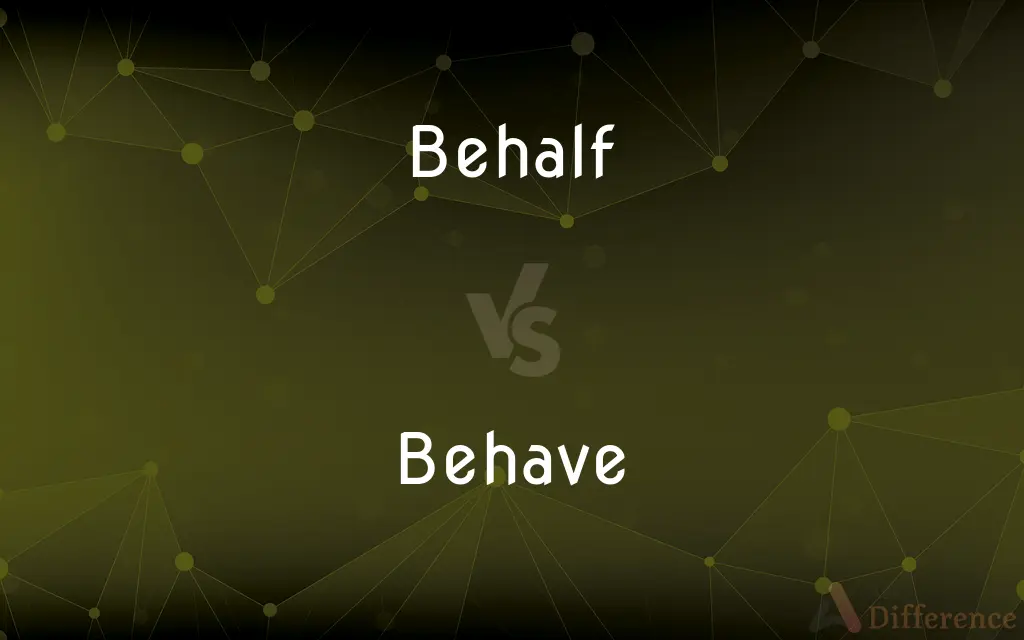Behalf vs. Behave — What's the Difference?
Edited by Tayyaba Rehman — By Urooj Arif — Updated on February 26, 2024
Behalf refers to the interest or support of someone, often used in the context of representation, while behave concerns the conduct or actions of an individual according to certain standards.

Difference Between Behalf and Behave
Table of Contents
ADVERTISEMENT
Key Differences
Behalf is a noun that signifies acting in the interest or support of another person or entity. It implies representation or advocacy, often in a legal, professional, or supportive capacity. Behave, a verb, describes the manner in which someone conducts themselves, often in accordance with societal norms or personal principles.
When someone acts on another's behalf, they are taking actions or making decisions that benefit the person they represent. This could be a lawyer representing a client in court or a friend speaking in support of another. Behaving, in contrast, focuses on the personal actions and reactions of an individual, which can be observed and judged by others based on appropriateness or adherence to expected standards.
Behalf often requires a formal or understood agreement or relationship, such as power of attorney, where one is authorized to act for someone else. Behaving, however, is a universal expectation, applicable in all social and personal contexts, requiring no formal agreement but rather an understanding of communal or societal norms.
The concept of behalf extends into expressions like "on behalf of," indicating representation or assistance, showing a direct relationship between the actor and those they represent. Behaving, whether good or bad, directly reflects on the individual's character and can influence how they are perceived by society or in specific communities.
"Behalf" involves a direct intention to support or represent another, "behave" is centered around the individual's actions and decisions, impacting their social interactions and relationships. Both terms highlight the importance of actions but from different perspectives: one from an external representation standpoint and the other from an individual conduct viewpoint.
ADVERTISEMENT
Comparison Chart
Part of Speech
Noun
Verb
Definition
Acting in the interest or support of someone else.
Conducting oneself in a certain way.
Context
Representation, advocacy, support.
Personal conduct, manners, societal norms.
Requirement
Formal or informal authorization to represent.
Understanding and adherence to societal or personal standards.
Expression
Often used in phrases like "on behalf of."
Described through adjectives like "well," "poorly," etc.
Compare with Definitions
Behalf
Representation of interests.
The attorney acted on behalf of her client.
Behave
To react under specific circumstances.
The material behaves differently at high temperatures.
Behalf
Acting for the benefit of someone else.
She spoke on his behalf at the meeting.
Behave
To manage or govern in point of behavior; to discipline; to handle; to restrain.
He did behave his anger ere 't was spent.
Behalf
Proxy or stand-in for someone.
Voting on behalf of a shareholder at the annual meeting.
Behave
To conduct oneself according to norms.
She always behaves respectfully in class.
Behalf
Supporting or advocating for someone.
He donated to the charity on his mother's behalf.
Behave
To manage one's actions in response to advice.
They behaved cautiously after the warning.
Behalf
Taking action for another's advantage.
Negotiations were conducted on behalf of the union.
Behave
To demonstrate good or bad manners.
He behaved rudely at the party.
Behalf
As the agent of or on someone's part (usually expressed as
On behalf of
In behalf of
The guardian signed the contract on behalf of the minor child
This letter is written on behalf of my client
Behave
To act in a specified manner.
The child behaved well at the dentist.
Behalf
Behalf offers short-term financing with flexible repayment terms to U.S. based businesses. Behalf pays vendors directly, on behalf of the small business, for the purchase of goods or services.
Behave
To conduct oneself or act in a specified way
One of the guests behaved badly at the party. Our old dog sometimes behaves like a puppy.
Behalf
Interest, support, or benefit.
Behave
To conduct oneself or act in a proper way
I told the child to behave.
Behalf
The interest, benefit, or wellbeing of someone or something.
Behave
To act, react, function, or perform in a particular way
This fabric behaves well even in hot weather.
Behalf
Advantage; favor; stead; benefit; interest; profit; support; defense; vindication.
In behalf of his mistress's beauty.
Against whom he had contracted some prejudice in behalf of his nation.
Behave
To conduct (oneself) properly
Did you behave yourself at the party?.
Behalf
For someone's benefit (usually expressed as `in behalf' rather than `on behalf' and usually with a possessive);
In your behalf
Campaigning in his own behalf
Spoke a good word in his friend's behalf
Behave
To conduct (oneself) in a specified way
The witness behaved herself with great calmness.
Behave
(reflexive) To conduct (oneself) well, or in a given way.
You need to behave yourself, young lady.
Behave
(intransitive) To act, conduct oneself in a specific manner; used with an adverbial of manner.
He behaves like a child whenever she's around.
How did the students behave while I was gone?
My laptop has been behaving erratically ever since you borrowed it.
Behave
To conduct, manage, regulate (something).
Behave
(intransitive) To act in a polite or proper way.
His mother threatened to spank him if he didn't behave.
Behave
To act; to conduct; to bear or carry one's self; as, to behave well or ill.
Behave
Behave in a certain manner; show a certain behavior; conduct or comport oneself;
You should act like a good person
Don't behave like a fool
What makes her do this way?
The dog acts ferocious, but he is really afraid of people
Behave
Behave in a certain manner;
She carried herself well
He bore himself with dignity
They conducted themselves well during these difficult times
Behave
Behave well or properly;
The children must learn to behave
Common Curiosities
Why is it important to behave well in public?
Good behavior is essential for social harmony and can positively influence one's reputation and relationships.
Is behaving a choice?
Yes, how one behaves is a personal choice influenced by moral values, societal norms, and individual temperament.
Can anyone act on my behalf?
Typically, someone can act on your behalf if they have your explicit consent or legal authority.
What is the legal significance of acting on someone's behalf?
It can have significant legal implications, especially in contractual agreements, medical decisions, or in court.
How should one behave in a formal setting?
With respect, politeness, and adherence to the specific norms or rules of the setting.
Can how one behaves affect their career?
Absolutely, as behavior impacts one's professional reputation and relationships in the workplace.
What does it mean to act on someone's behalf?
To take actions or make decisions that represent or benefit another person.
Can I authorize someone to act on my behalf without a legal document?
Yes, for non-legal matters, verbal consent may be sufficient, but legal or financial actions usually require formal documentation.
Why might someone need to act on another's behalf?
Due to incapacity, absence, convenience, or expertise in certain matters.
How does one learn to behave properly?
Through guidance from elders, societal norms, and personal experiences.
Is it possible to act on behalf of a group or organization?
Yes, individuals can represent groups or organizations, often holding a designated position or authority to do so.
What happens if someone behaves inappropriately?
They may face social disapproval, legal consequences, or disciplinary actions, depending on the context.
Can someone refuse to let another act on their behalf?
Yes, individuals can decide who is allowed to represent or act for them.
Does behaving well guarantee success?
While not a guarantee, good behavior can open doors and foster positive relationships, contributing to success.
How do culture and society influence behavior?
They provide the norms and values that guide acceptable behavior within a community.
Share Your Discovery

Previous Comparison
Divestment vs. Liquidation
Next Comparison
Flower vs. FlourAuthor Spotlight
Written by
Urooj ArifUrooj is a skilled content writer at Ask Difference, known for her exceptional ability to simplify complex topics into engaging and informative content. With a passion for research and a flair for clear, concise writing, she consistently delivers articles that resonate with our diverse audience.
Edited by
Tayyaba RehmanTayyaba Rehman is a distinguished writer, currently serving as a primary contributor to askdifference.com. As a researcher in semantics and etymology, Tayyaba's passion for the complexity of languages and their distinctions has found a perfect home on the platform. Tayyaba delves into the intricacies of language, distinguishing between commonly confused words and phrases, thereby providing clarity for readers worldwide.














































